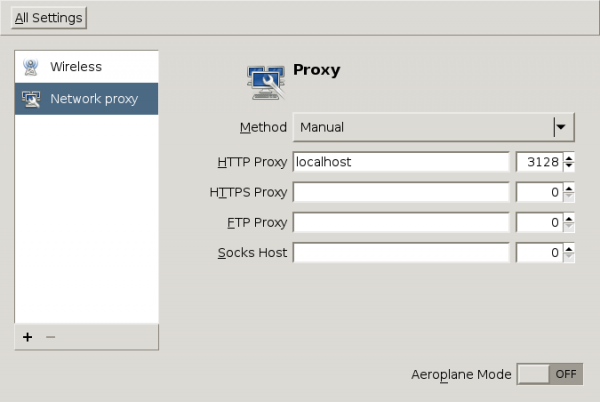Features/Proxy Settings: Difference between revisions
Sascha silbe (talk | contribs) →UI Design: update screenshots |
Sascha silbe (talk | contribs) Update to reflect current status |
||
| Line 5: | Line 5: | ||
== Summary == | == Summary == | ||
Allow the user to configure proxy settings using the Sugar Control Panel. | |||
== Owner == | == Owner == | ||
[[User:sascha_silbe|Sascha Silbe]] | |||
== Current status == | == Current status == | ||
* Targeted release: 0. | * Targeted release: 0.98 | ||
* Last updated: | * Last updated: 2012-02-14 | ||
* Percentage of completion: 95% | * Percentage of completion: 95% | ||
== Detailed Description == | == Detailed Description == | ||
Both individual users and deployments need to be able to set a proxy for | |||
Sugar and activities to use. While we'd like the system to work that all | |||
out automatically (e.g. using [https://en.wikipedia.org/wiki/Web_Proxy_Autodiscovery_Protocol WPAD]), this often isn't possible. Common | |||
reasons include legacy ("inherited") setups and network uplinks simply being | |||
out of control of the user respectively deployment. | |||
The existing Network Control Panel is enhanced by adding a new section for the | |||
proxy settings. For consistency between Sugar and Gnome, the basic layout of | |||
the Gnome 3 proxy settings has been mirrored: A combo box allows the user to | |||
select how the proxy setting should be determined (None=direct connection, | |||
Automatic=WPAD or PAC, Manual=enter host names and ports for each protocol). | |||
Based on which method was selected, additional configuration options are | |||
presented to the user. | |||
The settings are stored via gconf, using the same keys as Gnome 2. | |||
== Benefit to Sugar == | == Benefit to Sugar == | ||
See [[#Detailed Description|Detailed Description]]. | |||
== Scope == | == Scope == | ||
Modifying the existing Network Control Panel. | |||
== UI Design == | == UI Design == | ||
| Line 46: | Line 59: | ||
== How To Test == | == How To Test == | ||
* | * Set up a proxy on a computer in the same network | ||
* | * Open Owner icon → Network Control Panel | ||
* | * Change the proxy settings according to your proxy setup | ||
* Switch to Gnome and check that Gnome Control Center → Network → Network proxy has the same options set | |||
* | * Use Browse to access the [https://www.sugarlabs.org/ Sugar Labs home page] | ||
== User Experience == | == User Experience == | ||
See [[#UI Design|UI Design]] | |||
== Dependencies == | == Dependencies == | ||
There are no new dependencies. | |||
== Contingency Plan == | == Contingency Plan == | ||
Users can continue to use the Gnome Control Center to configure proxy settings. | |||
== Documentation == | == Documentation == | ||
There is no documentation beyond this page. | |||
== Release Notes == | == Release Notes == | ||
There have been no changes to public API. The Release Notes merely need to mention that users can now configure proxy settings from within Sugar. As detailed above, the UI is very similar to the Gnome UI. | |||
== Comments and Discussion == | == Comments and Discussion == | ||
* See [[{{TALKPAGENAME}}|discussion tab for this feature]] <!-- This adds a link to the "discussion" tab associated with your page. This provides the ability to have ongoing comments or conversation without bogging down the main feature page. --> | * See [[{{TALKPAGENAME}}|discussion tab for this feature]] <!-- This adds a link to the "discussion" tab associated with your page. This provides the ability to have ongoing comments or conversation without bogging down the main feature page. --> | ||
Revision as of 08:36, 14 February 2012
Summary
Allow the user to configure proxy settings using the Sugar Control Panel.
Owner
Current status
- Targeted release: 0.98
- Last updated: 2012-02-14
- Percentage of completion: 95%
Detailed Description
Both individual users and deployments need to be able to set a proxy for Sugar and activities to use. While we'd like the system to work that all out automatically (e.g. using WPAD), this often isn't possible. Common reasons include legacy ("inherited") setups and network uplinks simply being out of control of the user respectively deployment.
The existing Network Control Panel is enhanced by adding a new section for the proxy settings. For consistency between Sugar and Gnome, the basic layout of the Gnome 3 proxy settings has been mirrored: A combo box allows the user to select how the proxy setting should be determined (None=direct connection, Automatic=WPAD or PAC, Manual=enter host names and ports for each protocol). Based on which method was selected, additional configuration options are presented to the user.
The settings are stored via gconf, using the same keys as Gnome 2.
Benefit to Sugar
See Detailed Description.
Scope
Modifying the existing Network Control Panel.
UI Design
The Feature adds a new section to the Network Control Panel.
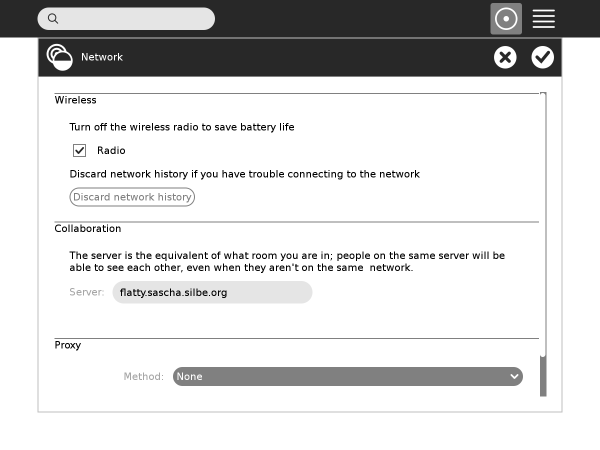
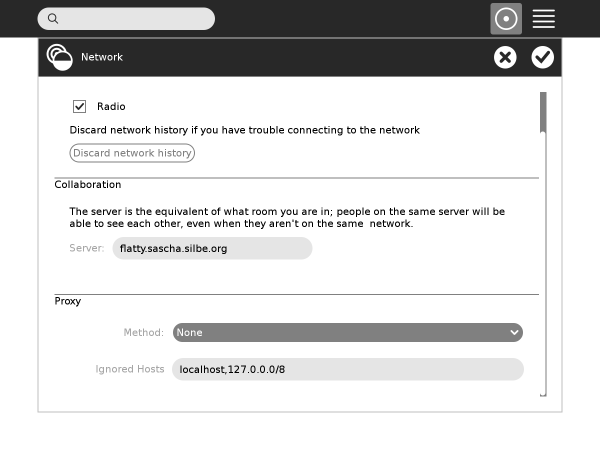
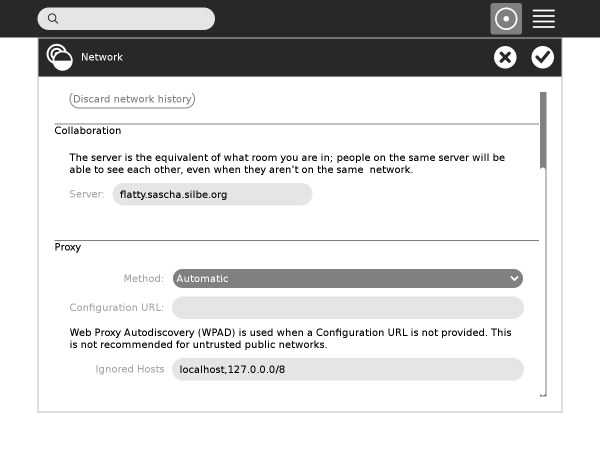
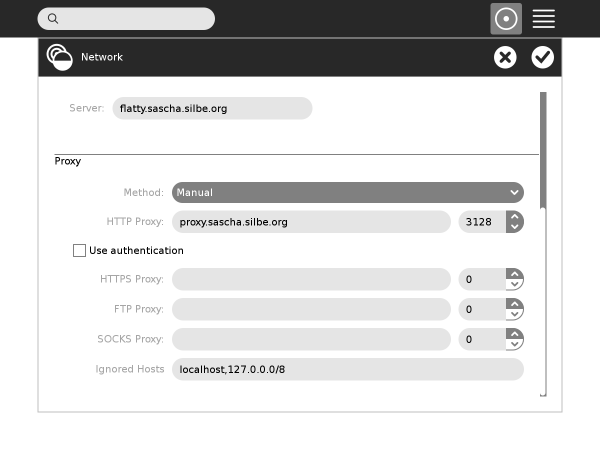
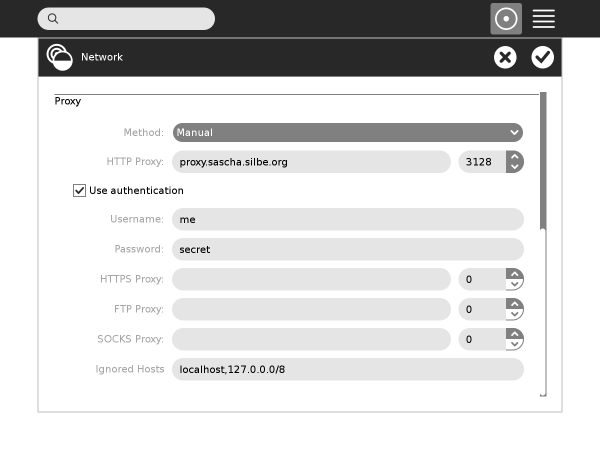
For comparison, this is what the Gnome 3 proxy settings dialog looks like:
How To Test
- Set up a proxy on a computer in the same network
- Open Owner icon → Network Control Panel
- Change the proxy settings according to your proxy setup
- Switch to Gnome and check that Gnome Control Center → Network → Network proxy has the same options set
- Use Browse to access the Sugar Labs home page
User Experience
See UI Design
Dependencies
There are no new dependencies.
Contingency Plan
Users can continue to use the Gnome Control Center to configure proxy settings.
Documentation
There is no documentation beyond this page.
Release Notes
There have been no changes to public API. The Release Notes merely need to mention that users can now configure proxy settings from within Sugar. As detailed above, the UI is very similar to the Gnome UI.
